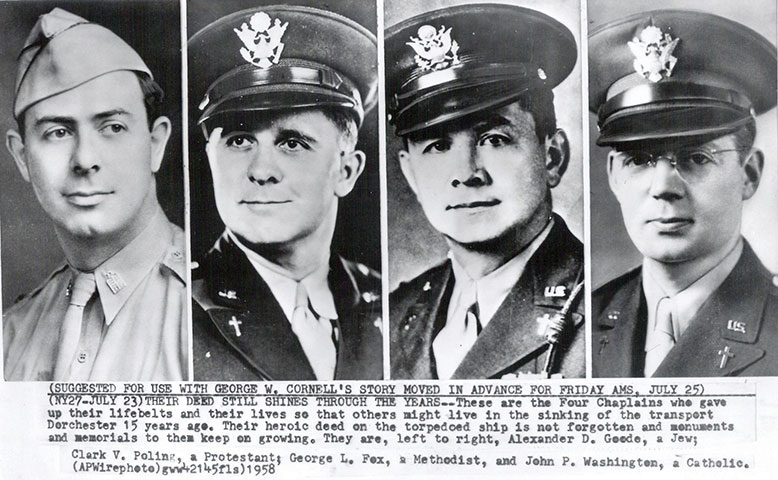
Shortly after midnight on February 3, 1943—75 years ago this month—a single German torpedo struck the U.S.A.T. Dorchester, an Army transport ship, as it traveled in the North Atlantic with 902 passengers aboard. The ship went down in less than 20 minutes.
Amid the chaos and flames, there were remarkable acts of heroism, most memorably on the part of a quartet of clergymen who would become known as the Four Chaplains: John P. Washington, a Catholic priest from Newark; Alexander D. Goode, a rabbi; Clark V. Poling, a Dutch Reformed minister; and George L. Fox, a Methodist minister.
As the stunned passengers—military personnel, merchant seamen and civilian workers—groped through the darkness after the attack, the clergymen went to work, aiding the wounded, guiding the disoriented to safety and urging all to be brave. When life jackets ran out, they gave up their own.
The Four Chaplains were among more than 670 victims who died that morning off the coast of Greenland. “The chaplains didn’t wake up that day thinking they would be heroes,” says Timothy P. Broglio, archbishop of the Archdiocese for the Military Services. “This was faith in action. The challenge is to live what you believe.”
Each of the chaplains had a New Jersey connection. Father Washington was born in Newark and served at three parishes in the Archdiocese of Newark. Relatives of Rabbi Goode still live in northern New Jersey. The Reverend Poling graduated from Rutgers University. The Reverend Fox passed through Camp Merritt in Cresskill on his way to Europe during World War I.
The Four Chaplains’ valor has been amply acknowledged. They each posthumously received the Distinguished Service Cross and Purple Heart on December 19, 1944. The U.S. Post Office, on May 28, 1948, issued a Four Chaplains stamp. On January 18, 1961, President Dwight D. Eisenhower, in one of his final acts as the nation’s chief executive, presented the men with a posthumous Special Medal for Heroism.
